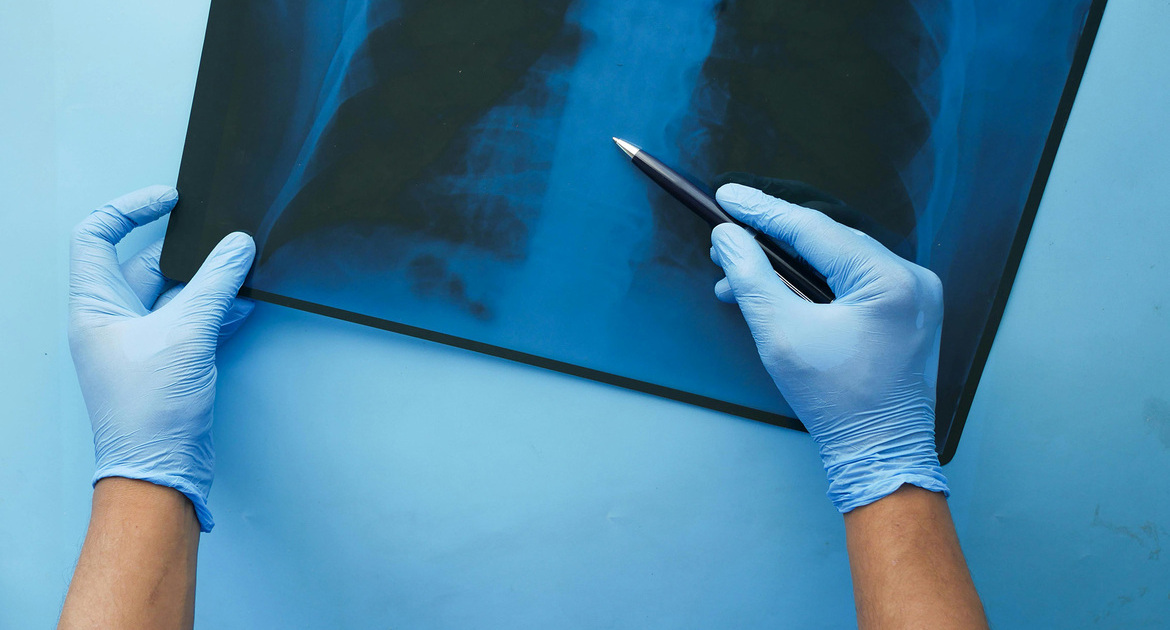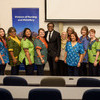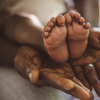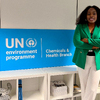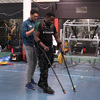FHS panel weighs in on the hard but necessary work of transformation
17 July 2024 | Story Rebecca Crowie. Photos Lerato Maduna. Voice Cwenga Koyana. Read time 8 min.
In a bid to foster a more inclusive, caring culture, the Faculty of Health Sciences (FHS) at the University of Cape Town (UCT) has embarked on a series of activities to memorialise and archive the stories of those who have suffered unjustly in the FHS, specifically in experiencing exclusion.
One of these was an illuminating and deeply personal conversation where four FHS colleagues of multiple generations shared their experiences of exclusion with Associate Professor Tracey Naledi, Deputy Dean: Social Accountability and Health Systems. Associate Professor Marc Hendricks, Amanda Hadebe, Professor Leslie London and Dr Abraham “Abe” Daniels further expressed their views on how the faculty could enhance a sense of belonging for all members of its diverse community.
Preceding the discussion was a heart-rending video of Dr Mohammed Cassiem D’arcy, a UCT medical graduate of 1963 and now retired doctor, who was denied a pathology teaching post at UCT due to his racial classification of “coloured”. This was despite him having received specialist training in Canada and having worked with technologies that South African scientists had not yet been exposed to. His story contextualised the institutional humiliation that “non-white” medical professionals endured.

Background of panellists and reflections on transformation
Associate Professor Hendricks is a paediatric oncologist jointly appointed by the Department of Paediatrics and Child Health in the FHS and the Western Cape Department of Health. He previously served as co-chair of the Transformation and Equity Committee in the FHS. He said with assuredness that, in a career spanning close to 25 years, “the seven years ... where my focus was primarily transformation – both in my department and at the university – were without question the most difficult seven years of my career”.
Hendricks problematises the prominence of “black” people in the transformation domain: “It is not common to see ‘white’ faces around a table as part of a committee who are taking responsibility for change in the same way,” he soberly pointed out.
Hadebe, a third-year occupational therapy (OT) student and the transformation officer on the Health Sciences Students’ Council, spoke from her experience of being born and raised in rural KwaZulu-Natal where she was part of a “racially” homogenous community. She had not encountered people who did not look like her before entering UCT.
In her first year as a UCT student, Hadebe started experiencing disorientation because she saw no “black” OTs and started having doubts about “black” success in the OT field.
“I felt very excluded in this profession and it really affected me because I didn't know if I was going to make it or if anyone who looked like me ever made it.”
To her alarm, this lack of representation in the OT field extended beyond UCT. She chose to job shadow at a Cape Town hospital and, even there, found no “black” OTs. “I felt very excluded in this profession and it really affected me because I didn't know if I was going to make it or if anyone who looked like me ever made it.”
Professor London, the chair of public health medicine at UCT and a man with a long-running career as a human rights activist, asserted that transformation cannot solely be the job of “black” people, women or disabled people. It must be everybody’s concern.
London maintains that it is equally important that colleagues in the FHS support those who have access to resources and power and who commit to doing the hard work of transformation. He echoed Hendricks’ point that transformation is a hard job and that those spearheading the transformation project are often the subject of people’s reproach.
How exclusion has presented itself in the Faculty of Health Sciences
Speaking as a “black” person and a member of the LGBTQ+ community, Hendricks said that he has experienced more exclusion on the basis of his colour in the latter part of his career due to his involvement in the transformation space. He added that there has been a total absence of a safe queer space in the FHS.
Another example of exclusion, which Hadebe cited, is the interdisciplinary hierarchies in the FHS. Administratively, the Department of Health and Rehabilitation in the FHS houses the disciplines of audiology, disability studies, occupational therapy, physiotherapy and speech-language pathology. The Bachelor of Medicine and Bachelor of Surgery (MBChB) students have a distinct programme convener. Hadebe explained that health and rehabilitation students learn a great deal about what doctors do, but MBChB students learn nothing about them.
“We need to move away from this theory of trying to create safe spaces — because people tend to think that because it’s a safe space it has to be comfortable.”
Hadebe added that MBChB students are often confused in clinical settings and are not clear on the differences between some of the disciplines, such as OT and physiotherapy. She maintained that this pushes exclusion and perpetuates hierarchies and inequality.
Dr Daniels, a retired paediatrician, spoke about attending UCT as a “coloured” student when the university was complicit in apartheid-era practices. However, Daniels (who graduated with an MBChB in 1973) said that he was fortunate to witness UCT transform over the years as his three sons attended UCT and enjoyed UCT life, in sharp contrast to his experience. He believes it is essential to engage with alumni who hold strong views about UCT and whose feelings diverge from the mainstream.
Building braver spaces
Hadebe is an advocate for engaging in difficult conversations if it means it will bring about meaningful change. She cited an inspiring lecturer of hers, who told her students: “We need to move away from this theory of trying to create safe spaces – because people tend to think that because it’s a safe space it has to be comfortable, it has to be safe and that they’re protected in this space – and start moving towards forming braver spaces where we have uncomfortable conversations ... and where people are open to being challenged.”
Hendricks advised two courses of action: using one’s voice and getting involved. “We should stop being complicit by our silence, and we should get involved in the work of change, which is a collective responsibility.”
Hendricks cautioned that racism and homophobia are not the problems of “black” or queer people; they are the problems of people who perpetrate racism and homophobia. Consequently, it cannot be the responsibility and burden of “black” or queer people to educate others about racism or homophobia. Everyone should take responsibility and educate themselves.
“We should stop being complicit by our silence.”
London suggested implementing a system of rewarding academic, and professional, administrative support and service staff for engaging in transformation work, as that is absent in the university.
London offered another suggestion: “I think we should build on what we’ve done, because we have a tendency to let things go and then we bring in new people. New people start from scratch, and we don’t actually consolidate what’s gone before.”
Daniels encouraged UCT graduates to attend their alumni meetings. Noting that there were more white people at these meetings, he urged people from other races to attend as he believes their stories would be a value-add. Nonetheless, he concluded by saying that he is “happy with the transformation that’s happening at UCT as the time goes by. I mean, all places have their issues and so on. But I think we’re on the right track and we must just try to deal with the history and let people understand what has happened.”
 This work is licensed under a Creative Commons Attribution-NoDerivatives 4.0 International License.
This work is licensed under a Creative Commons Attribution-NoDerivatives 4.0 International License.
Please view the republishing articles page for more information.
Faculty of Health Sciences News

Researchers argue for using “informed proxy consent” or “relational autonomy consent” in human aDNA research.
12 Nov 2025 - 7 min read Republished







